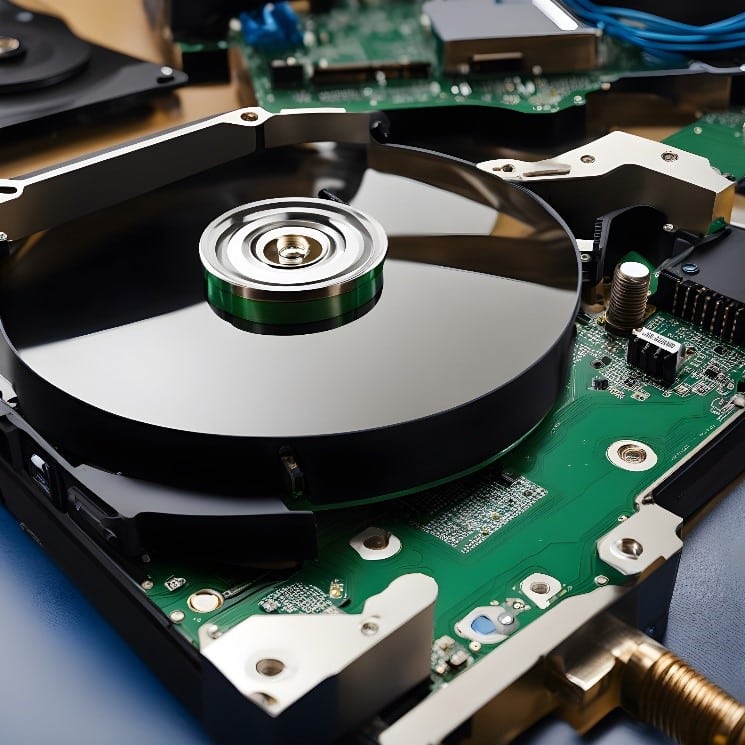In the evolving landscape of data security, the question arises: “Why You Should Degauss Your HDD?” This comprehensive guide unravels the critical aspects of data destruction, emphasizing the necessity and efficacy of degaussing to preserve confidentiality. Dive into the benefits that degaussing offers, making it an important step in securing your obsolete Hard Disk Drive (HDD).
How Degaussing Works: Altering the Magnetic Field of the HDD (Hard Disk Drive)
Degaussing is a highly effective method for data destruction, primarily aimed at Hard Disk Drives (HDDs). It operates on a simple yet powerful principle which is to alter the magnetic field.
Magnetic Storage – To understand degaussing, it’s essential to know how data is stored on an HDD. Data is written and read through changes in magnetic polarity on the disk’s surface. Each bit of information is represented as a magnetic charge.
Magnetic Field Alteration – Degaussing involves exposing the HDD to an intense magnetic field, generated by a degausser machine. This magnetic field is far stronger than the one normally used to write data onto the HDD.
Neutralizing Magnetic Charges – The degausser effectively neutralizes the magnetic charges on the HDD’s platters. It does this by introducing a strong, alternating magnetic field that randomizes the magnetic orientation of the data.
Data Unrecoverable – As a result, the data stored on the HDD becomes unrecoverable. It’s akin to erasing a chalkboard filled with information—once the magnetic charges are scrambled, the original data is effectively gone.
Comprehensive Destruction – Unlike some data wiping methods that leave traces of the original information, degaussing offers comprehensive data destruction. It ensures that even the most advanced data recovery techniques can’t resurrect the information previously stored on the HDD.
By altering the magnetic field to a chaotic state, degaussing guarantees that your sensitive data remains completely irretrievable. This is why it’s considered one of the most secure methods for disposing of retired HDDs, protecting your data and ensuring your peace of mind.

Importance of Secure Data Disposal
In an era dominated by digital information, the secure disposal of data-bearing hardware, such as HDDs or SSDs, is paramount. Failing to ensure proper data destruction can expose individuals and organizations to a host of risks and legal dilemmas.
Mitigating Risks Associated with Improper Disposal
Improper disposal of HDDs can lead to a range of risks:
Data Breaches: When HDDs are not securely disposed of, the data stored on them remains vulnerable to unauthorized access. This exposes sensitive information, which can lead to data breaches, identity theft, and privacy violations, Especially PDPA in Singapore.
Misuse: Discarded HDDs, if not properly destroyed, can end up in the hands of individuals with malicious intent. Even partially deleted data can be recovered using specialized software, putting your confidential data at risk.
Damage to reputation: In an age where data security and privacy are of utmost concern, any security lapses can result in a damaged reputation for both individuals and businesses. Trust is hard-won and easily lost.
Legal and Ethical Considerations in Data Protection
Data Protection Laws: Various data protection regulations, such as the Personal Data Protection Act (PDPA) in Singapore, impose legal responsibilities on organizations to safeguard sensitive personal data, even in its disposal. Failure to comply with these laws can result in severe penalties.
Ethical Responsibility: Beyond legal obligations, there’s an ethical responsibility to protect the privacy and confidentiality of individuals. This applies to both personal and organizational data. Failing to uphold these ethical principles can tarnish reputations and trust.
Environmental Responsibility: Ethical considerations extend to the environment as well. Secure data disposal practices, including responsible recycling, help reduce electronic waste (e-waste) and minimize the environmental impact of electronic equipment disposal.
How Degaussing Helps Meet Legal Obligations
Degaussing HDDs aligns with legal compliance requirements in several ways –
Data Irretrievability: Degaussing ensures that data on HDDs is rendered irretrievable. This means that even in the event of hardware disposal, the data stored on the disk is beyond recovery. Compliance with data protection laws often mandates the secure and complete destruction of data.
Privacy Protection: Degaussing contributes to privacy protection by preventing the unauthorized access and use of personal and sensitive information. This aligns with the core principles of data protection laws.
Demonstrable Compliance: Degaussing offers a clear and auditable process for data destruction. It provides organizations with a means to demonstrate their commitment to legal compliance by maintaining a record of secure disposal.
What Arkiva Offers
Arkiva takes data security to the next level. We offer:
Professional Degaussing Services: With state-of-the-art degausser machines, Arkiva ensures the complete and secure destruction of data on HDDs.
Certificate of Destruction: We provide a clear record of the degaussing process, offering tangible proof of secure data disposal.
Environmental Responsibility: Arkiva prioritizes eco-friendly practices, ensuring that e-waste disposal aligns with environmental sustainability.
In choosing Arkiva, individuals and businesses not only embrace uncompromising data security but also gain the peace of mind that comes from knowing their sensitive information is protected. It’s not just data disposal; it’s a commitment to a secure and sustainable future.

